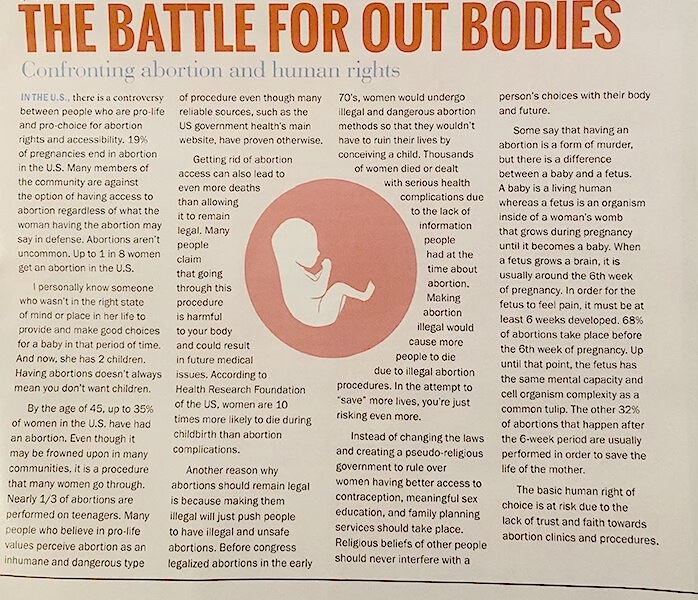Regis Jesuit High School Fires Journalism Advisors, Removes Winter Issue of Student Magazine Over Pro-Choice Op-Ed
Elevate Magazine
Regis Jesuit High School’s principal and president said they fired the advisors to their student magazine program and retracted the winter issue in its entirety over a pro-choice op-ed. The op-ed, pictured above, mostly argued for the safety of anti-abortion laws and the human rights involved.
January 11, 2022
Regis Jesuit High School fired the advisors of its Elevate student magazine and retracted the winter issue over a pro-choice op-ed last month, a letter from the school’s principal and president says.
The op-ed, written by a freshman at Regis, gave reasons why abortion should be legal based on the safety of people receiving abortions and the human rights involved. The school, which is a Jesuit Catholic institution, cited Church principles about the value and dignity of life in their decision.
“Earlier this week, the winter edition of the student produced Elevate magazine was released to the student body,” a letter from Regis President David Card and Principal Jimmy Tricco read. “An opinion piece that presented a stance on abortion clearly in opposition to Church teaching was included that we found both deeply troubling and unacceptable.”
The letter continued: “First, we want to be clear that as a Catholic, Jesuit institution we believe that life begins at conception. We believe that protection of life at this stage represents the foundational requirement of respecting the dignity of human life at every stage.”
The decision was met with backlash from students both in the journalism program and elsewhere.
“As a Catholic school, I do understand that they have to abide by Church policies that are pro-life, I just don’t agree with how they’re handling it,” Regis student Alice (name withheld) said. “Even as a pro-life school, they could have gone about it differently.”
Alice’s attitude was common among many students: they’d expected Regis would promote pro-life ideas in accordance with the Church, but they hadn’t expected an action this extreme.
“I expected pro-life rhetoric in masses, over prayer, et cetera, but I didn’t expect them to censor the speech of students, especially in an op-ed article,” Regis student Janice (name withheld) said. “I went to Regis because of the community and the academic advantages, which I felt outweighed these tensions. However, with these new developments I am reconsidering my decisions because I do not feel supported by the administration.”
This is not the first time Regis has censored their student publications. Earlier this school year, a survey students in the journalism program sent out about identity and feeling supported at Regis “received pushback from the administration,” according to former editor-in-chief Madeline Proctor, who graduated this May. In light of the administration’s most recent decision, Proctor said the LGBTQ article “may have compelled the administration to take a closer look at the media program itself.”
Regis’s decision to retract the article and the issue it appeared in may have in part been because of pressure from the Denver Archdiocese and Archbishop Samuel Aquila.
“Let it be clear should there be any doubt, abortion, along with euthanasia, are the preeminent issues for the Catholic Church today,” Aquila wrote in a Dec. 23 letter from his office. “It is of the utmost importance because it is as the Holy Father, Pope Francis, has reiterated time and time again, ‘an absolute evil’…I am grateful that the leadership of Regis Jesuit High School promptly retracted the article and addressed this situation recognizing the failure that took place in allowing this to be published.”
Another former editor-in-chief from Regis’s magazine, Sophia Marcinek, who graduated in 2020, recalled an article Elevate had published with similar contradictions to things the Church had said, including a pro-Blue Lives Matter op-ed and a report on sexual abuse in the church.
However, Marcinek said, Elevate had previously created editorial policies, approved by the school, that essentially allowed them to publish what they wanted with few exceptions.
“As long as we follow those, then everything we publish is fine. And then something like this that directly contradicts what the Church believes, apparently is, in violation of the Church’s teaching?” Marcinek said. “Well, there’s so many things that we’ve published that have been in violation of the Church’s teachings. It doesn’t say, in our editorial policies, that we can’t [publish] things that are in direct contradiction of the church, because if that was written in there, then we would have had issues long before this. Why is it now that they’re choosing to make an example of the situation?”
While the editorial policies are no longer available on Regis’s media website, rjmedianow.com, a portion of it was published in a Denver Post article about the recent incident. The policies, which Marcinek helped to create in her time at the school, were that “The publications’ advisers will not act as a censor or have final say in determining the content of the media. Rather, the advisers will teach journalistic skills and guide the students in making sound legal and ethical decisions… School officials, administration or faculty and staff, likewise, shall not practice prior review or to censor any student media, with the exception of material deemed to be legally obscene, libelous, substantially and materially disruptive…”
Proctor recalled that the only exceptions to this she could remember were “the firing of a staff member, a crime that’s in court or actually being investigated, and the death of a member of the school community.”
Proctor, who did not choose Regis for its religious affiliation, along with many present and former Regis students, valued the open conversations Regis fostered among its students – and felt this was especially recognized in the journalism classroom. But now, Proctor feels betrayed.
“All the time that we spent memorizing the First Amendment and listening to Mary Beth Tinker and talking about the power of a free press is sort of being washed away,” Proctor said. “Or it feels sort of that that was all meaningless, especially for future class years, who won’t have those same freedoms.”
The impact of Regis’s reaction to the article reaches further than their journalists or even current students – Proctor believes Regis’s future students will not have the same positive experience at the school that she did.
“And if that’s not the same experience for future generations, then I wouldn’t want my kids going there.”
This article won First Place Digital Media Breaking News from CSPA and First Place Breaking News from CSMA.





![Creek students rush to their first period class Dec. 10. In part because it was so late, Denver's first snow of the season complicated commutes and made getting to school harder, resulting in many students being late. "I got into [an] accident today," junior Ella Sommerfeld said of her morning commute.](https://unionstreetjournal.com/wp-content/uploads/2021/12/IMG_3202-300x225.jpg)



















